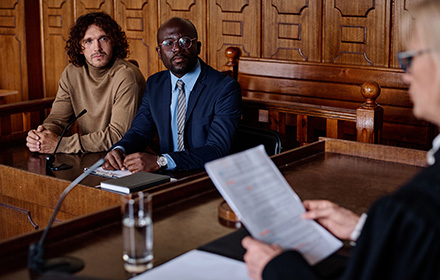Difference Between Court-Martial and Civilian Criminal Trial
October 16, 2025
When someone faces criminal charges, the process they go through depends on whether they are military members or civilians. Service members of the United States Armed Forces are subject to the Uniform Code of Military Justice (UCMJ), which means they may be tried in a court-martial rather than in a civilian criminal court. While both systems share the goal of determining guilt or innocence, the procedures, laws, and consequences are very different. Remember, military members can be tried in both military and local civilian tribunals.

This article explains the key differences between a court-martial and a civilian criminal trial so you can understand what to expect if you or a loved one is facing charges.
Jurisdiction: Who Gets Tried Where?
Court-Martial: Applies to active-duty service members, certain reservists, and in some cases, military retirees. A court-martial can address both military-specific offenses (like desertion, insubordination, or absence without leave) and crimes recognized in civilian law (like assault, theft, or drug possession).
Civilian Criminal Trial: Applies to the general public. Civilian courts handle crimes under state laws or federal laws, and sometimes prosecute service members as well if the offense occurs off-base and outside military jurisdiction.
The Law Applied
Court-Martial: Governed by the UCMJ and the Manual for Courts-Martial, which include military-only offenses and rules of evidence.
Civilian Trial: Governed by state criminal codes or federal statutes, along with standard rules of criminal procedure and constitutional protections.
Judges and Jury (Panel)
Court-Martial: Presided over by a military judge. Instead of a civilian jury, the accused is tried before a panel of military members selected by the convening authority. Unlike civilian trials, a guilty verdict can often be reached with a two-thirds majority rather than requiring unanimity.
Civilian Criminal Trial: Presided over by a civilian judge. Defendants usually have the right to a 6-person jury in State Court and 12 jurors in Federal Court, and a guilty verdict must be unanimous (in most jurisdictions).

Rights of the Accused
Court-Martial: Service members still have key constitutional rights, such as the right to remain silent, the right to counsel, and the right to confront witnesses. However, the military system may impose unique restrictions, such as pretrial confinement without bail or command-directed investigations.
Civilian Trial: Defendants have full constitutional rights under the Bill of Rights, including protection against unlawful searches, the right to bail, and the right to a public trial.
Punishments
Court-Martial: Penalties can include imprisonment, dishonorable or bad-conduct discharge, reduction in rank, forfeiture of pay and benefits, and confinement. A conviction can permanently end a military career and affect civilian opportunities after service.
Civilian Trial: Penalties typically include jail or prison, probation, fines, or community service. Civilian courts do not impose military-specific punishments like discharge or loss of rank.
Appeals Process
Court-Martial: Appeals are reviewed by military appellate courts, such as the Army Court of Criminal Appeals or the Navy-Marine Corps Court of Criminal Appeals. From there, cases can go to the Court of Appeals for the Armed Forces (CAAF), a civilian federal court.
Civilian Trial: Appeals go through the state appellate system or the federal appeals courts, and in rare cases, may be reviewed by the U.S. Supreme Court.
Summary Table

Why Legal Representation Matters
Whether in a court-martial or a civilian trial, the stakes are high. Military members not only risk losing their freedom but also their careers, benefits, and reputation. Civilians may face long-lasting criminal records, incarceration, and financial penalties.
Having an experienced defense attorney is critical to protecting your rights and building the strongest defense possible.
Donet, McMillan & Trontz, P.A.: Protecting Your Rights in Civilian and Military Cases
At Donet, McMillan & Trontz, P.A. (DMT), our experienced criminal defense attorneys have successfully represented military members in both civilian and military courts. We understand the unique challenges of the military justice system and how it differs from civilian criminal trials.

Our firm is committed to:
- Defending service members facing court-martial charges.
- Representing civilians in state and federal criminal trials.
- Protecting your constitutional rights every step of the way.
If you or a loved one is under investigation or has been charged, don't wait to get the defense you need. Contact Donet, McMillan & Trontz, P.A. today for a confidential consultation.





















